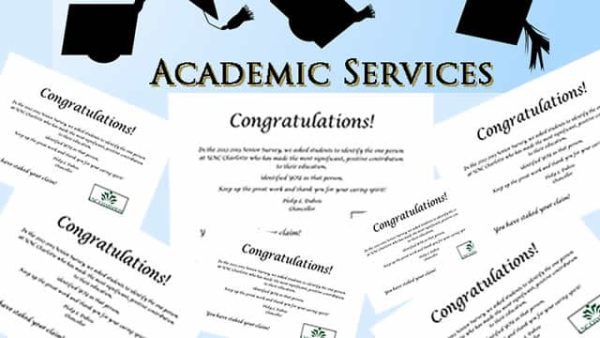Senior recognition of faculty and staff still going strong

Now in its third year at UNC Charlotte, the “Thank You Card” recognition program continues to grow in size and impact. Beginning in 2013, Chancellor Philip L. Dubois sent 631 thank you cards to members of UNC Charlotte’s faculty and staff who were nominated by graduating seniors on the 2012-13 Senior Survey.
In January 2016, 721 faculty and staff members received thank you cards. A total of 2,930 nominations came from graduating seniors from the 2014-15 Senior Survey. Many students nominated multiple persons, departments or offices across campus. This is an increase of 1,187 nominations from the first year of the program.
Many nominees felt rewarded for their efforts upon receiving a thank you card.
Amy Good from the Department of Reading and Elementary Education, stated “receiving the thank you notes means I’m doing my job. It means I have passed on the love I have for my profession… It’s so rewarding knowing the students have picked up on that.”
Patricia Tolley, associate dean of the Lee College of Engineering, said that the recognition “…gives meaning to the work I do every day. I am humbled that in some small way I may have made a positive impact on a student.”
Nominees also expressed joy at the thought of the impact that they have made in students’ lives.
Alan Freitag, a professor in the Department of Communication Studies, conveyed that “no other recognition I receive as an instructor means more to me. The greatest satisfaction I gain from teaching is watching great young men and women launch their professional careers, and I delight in the possibility that I have provided them, at least in part, with the knowledge, skills, abilities, principles and mindsets…” for their success.
The recognitions that come with the thank you cards also allow nominees to reflect on their work.
“I think I was nominated because I like to try new things; each of my classes is different,” said Good. She added, “I value and care about my students … I work hard to create a classroom community where the students want to be there.”
These thoughts were echoed by Mitchell Eisner from the Department of Reading and Elementary Education. He explained, “I believe that my students realize that I am not only providing them with tools and strategies to be successful in the future, but they know they can reach out to me for advice years after they have graduated. By making my course work have connectivity to real-world applications adds a wealth of power to prepare them for the workforce after graduation. “
For many of the students surveyed, preparation for their futures began with the connections that were made during their time on campus. Many of the nominations are reflective of those connections. As Freitag explains, “I hope they sense my commitment to their becoming productive citizens and community leaders. I hope they appreciate my holding them accountable and expecting their best.”